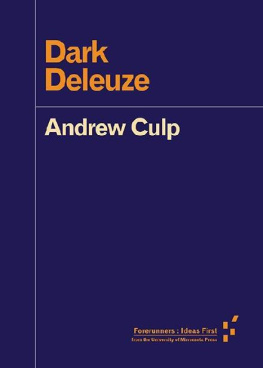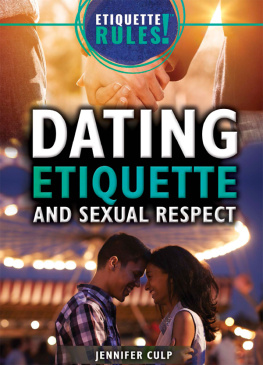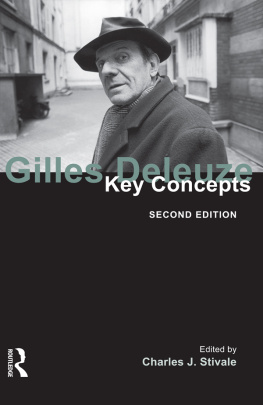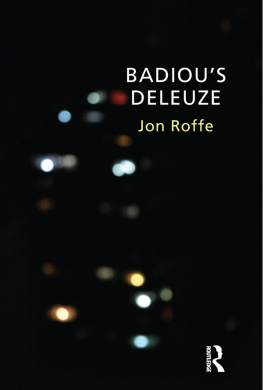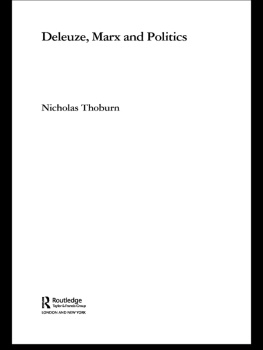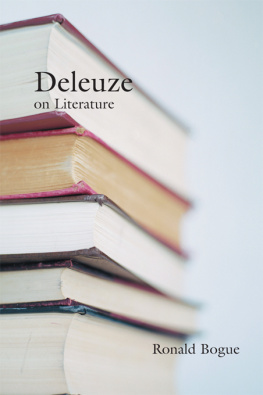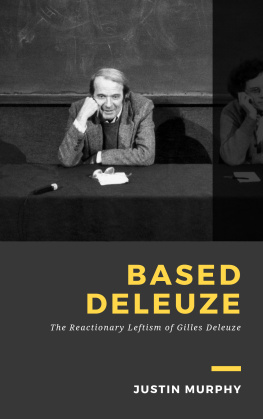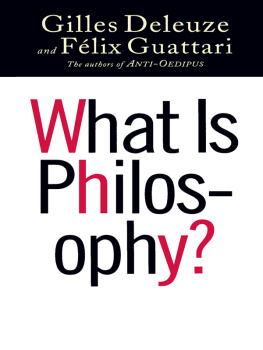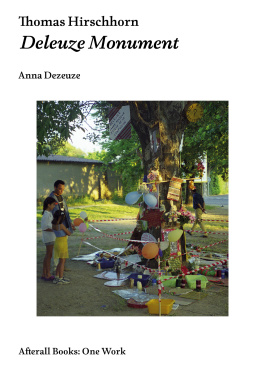Andrew Culp - Dark Deleuze
Here you can read online Andrew Culp - Dark Deleuze full text of the book (entire story) in english for free. Download pdf and epub, get meaning, cover and reviews about this ebook. year: 2016, publisher: University of Minnesota Press, genre: Science. Description of the work, (preface) as well as reviews are available. Best literature library LitArk.com created for fans of good reading and offers a wide selection of genres:
Romance novel
Science fiction
Adventure
Detective
Science
History
Home and family
Prose
Art
Politics
Computer
Non-fiction
Religion
Business
Children
Humor
Choose a favorite category and find really read worthwhile books. Enjoy immersion in the world of imagination, feel the emotions of the characters or learn something new for yourself, make an fascinating discovery.
- Book:Dark Deleuze
- Author:
- Publisher:University of Minnesota Press
- Genre:
- Year:2016
- Rating:4 / 5
- Favourites:Add to favourites
- Your mark:
- 80
- 1
- 2
- 3
- 4
- 5
Dark Deleuze: summary, description and annotation
We offer to read an annotation, description, summary or preface (depends on what the author of the book "Dark Deleuze" wrote himself). If you haven't found the necessary information about the book — write in the comments, we will try to find it.
Dark Deleuze — read online for free the complete book (whole text) full work
Below is the text of the book, divided by pages. System saving the place of the last page read, allows you to conveniently read the book "Dark Deleuze" online for free, without having to search again every time where you left off. Put a bookmark, and you can go to the page where you finished reading at any time.
Font size:
Interval:
Bookmark:
Forerunners: Ideas First from the University of Minnesota Press
Original e-works to spark new scholarship
F ORERUNNERS IS A thought-in-process series of breakthrough digital works. Written between fresh ideas and finished books, Forerunners draws on scholarly work initiated in notable blogs, social media, conference plenaries, journal articles, and the synergy of academic exchange. This is gray literature publishing: where intense thinking, change, and speculation take place in scholarship.
Ian Bogost
The Geeks Chihuahua: Living with Apple
Andrew Culp
Dark Deleuze
Grant Farred
Martin Heidegger Saved My Life
John Hartigan
Aesops Anthropology: A Multispecies Approach
Akira Mizuta Lippit
Cinema without Reflection: Jacques Derridas Echopoiesis and Narcissism Adrift
Reinhold Martin
Mediators: Aesthetics, Politics, and the City
Shannon Mattern
Deep Mapping the Media City
Jussi Parikka
The Anthrobscene
Steven Shaviro
No Speed Limit: Three Essays on Accelerationism
Sharon Sliwinski
Mandelas Dark Years: A Political Theory of Dreaming
Andrew Culp
University of Minnesota Press
Minneapolis
Dark Deleuze by Andrew Culp is licensed under a Creative Commons Attribution-NonCommercial-ShareAlike 4.0 International License.
Published by the University of Minnesota Press, 2016
111 Third Avenue South, Suite 290
Minneapolis, MN 55401-2520
http://www.upress.umn.edu
The University of Minnesota is an equal-opportunity educator and employer.
C1 Cinema 1: The Movement-Image (1986)
C2 Cinema 2: The Time-Image (1989)
D Dialogues 2 (with Claire Parnet; 2007)
DI Desert Islands (2004)
DR Difference and Repetition (1994)
ECC Essays Critical and Clinical (1997)
F Foucault (1988)
FB Francis Bacon (2005)
H Empiricism and Subjectivity: An Essay on Humes Theory of Human Nature (1991)
L The Fold: Leibniz and the Baroque (1993)
LS Logic of Sense (1990)
N Negotiations (1997)
NP Nietzsche and Philosophy (1983)
P Proust and Signs (2000)
PI Pure Immanence (2005)
S Expressionism in Philosophy: Spinoza (1990)
TR Two Regimes of Madness (2007)
AO Anti-Oedipus (1977)
K Kafka: Toward a Minor Literature (1986)
TP A Thousand Plateaus (1987)
WP What Is Philosophy? (1994)
S UMMARIZING HIS DEEPLY IDIOSYNCRATIC WORK, French philosopher Gilles Deleuze describes writing about others as a sort of buggery or immaculate conception that is the result of taking an author from behind and giving him a child (N, 6). Deleuze is still quick to distinguish his project from outright falsification. He strictly limits himself to what an author actually says; he attends to a thinkers shifting, slipping, dislocations, and hidden emissions to give him a child that would be his own offspring, yet monstrous (N, 6). More than thirty years after making these remarks, Deleuze now has plenty of little monsters of his ownrootless rhi-zombies, dizzying metaphysicians, skittish geonaturalists, enchanted transcendentalists, passionate affectivists. My aim is to give him another child that shares his last name: Dark Deleuze.
Deleuze once told a friend that a worthwhile book performs at least three functions: polemics, recovery, and creativity. In writing the book, the author must reveal that (1) other scholarship commits an error; (2) an essential insight has been missed; and (3) a new concept can be created. You will find all three is this book. First, I argue against the canon of joy that celebrates Deleuze as a naively affirmative thinker of connectivity. Second, I rehabilitate the destructive force of negativity by cultivating a hatred for this world. Third, I propose a conspiracy of contrary terms that diverge from the joyous task of creation.
Picking out a particular strain of thought: scholars of new materialism turn to realist ontology by way of Deleuzes metaphysics of positivity. The basis for the realist side of Deleuze is perhaps best evinced by his biography. Those who knew Deleuze consistently note his firm commitment to joyful affirmation and his distaste for the ressentiment of negativity. Beatifying this sentiment, Deleuze has been used to establishing a whole canon of joy. In the canon of joy, the cosmos is a complex collection of assemblages produced through the ongoing processes of differentiation. The effect of the Joyous Deleuzes image of thought is a sense of wonder, accompanied by the enjoyment of creating concepts that express how the world really exists.
A different Deleuze, a darker one, has slowly cast its shadow. Yet this figure only appears when we escape the chapel choir of joy for the dark seclusion of the crypt. Emerging from scholars concerned with the condition of the present, the darkness refashions a revolutionary Deleuze: revolutionary negativity in a world characterized by compulsory happiness, decentralized control, and overexposure. This refashioned Deleuze forms a countercanon out of the perfused negativity of his concepts and affects. On the level of concept, it recognizes that negativity impregnates Deleuzes many prefixes of difference, becoming, movement, and transformation, such as de-, a-, in-, and non-. On the level of affect, it draws on Deleuzes talk of indiscernibility, concealment, the shame of being human, and the monstrous power of the scream. The ultimate task of this approach is not the creation of concepts, and to the extent that it does, Dark Deleuze creates concepts only to write apocalyptic science fiction (DR, xxxxii).
Michel Foucault half-jokingly suggested in 1970 that perhaps one day, this century will be known as Deleuzian (Theatrum Philosophicum, 885). It is easy to see how boosters have used this phrase to raise the profile of Deleuze, who was far less popular than Foucault or Derrida during the initial reception of poststructuralism in America. But what if it is a subtle jab? Foucault makes the remark in the same breath as a reference to Pierre Klossowski, a crucial member of the secret society Acphale, which helped revive Nietzsche in France when others too easily dismissed the thinker as fascist. Historically fitting would be an insult to Nietzsche, who proudly proclaims the untimeliness of thought acting counter to our time and thereby acting on our time and, let us hope, for the benefit of a time to come at the beginning of his essay on the uses and abuses of history for life (Untimely Meditations, 60). As a major French interlocutor of Nietzsche, Deleuze uses this exact same phrase on untimeliness in the opening pages of Difference and Repetitionthe very book that Foucault was reviewing when he made the comment. Bearing out the implication by mincing another Nietzschean phrase, then perhaps Foucault was accusing him of being timely, all too timely.
What would make Deleuzes thought especially timely? Critics such as Slavoj iek accuse him of being a poster child for the cultural excesses of postmodern capitalism (Ongoing Soft Revolution). A recent round of denunciations underwritten by a mix of wonderment and red-baiting exclaim, The founder of BuzzFeed wrote his senior thesis on the Marxism of Deleuze and Guattari!, adding to a long list of guilty associationsthe Israeli Defense Force reads A Thousand Plateaus
Font size:
Interval:
Bookmark:
Similar books «Dark Deleuze»
Look at similar books to Dark Deleuze. We have selected literature similar in name and meaning in the hope of providing readers with more options to find new, interesting, not yet read works.
Discussion, reviews of the book Dark Deleuze and just readers' own opinions. Leave your comments, write what you think about the work, its meaning or the main characters. Specify what exactly you liked and what you didn't like, and why you think so.

